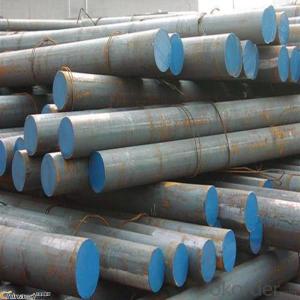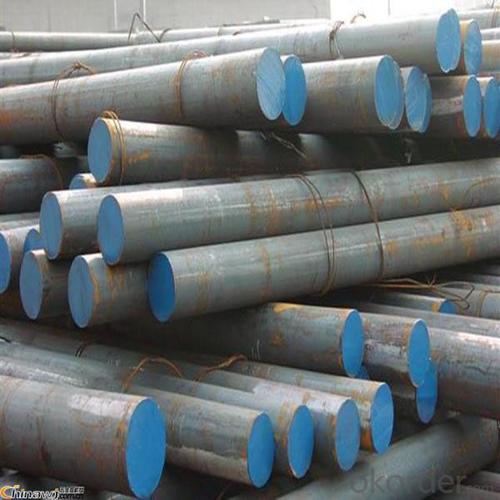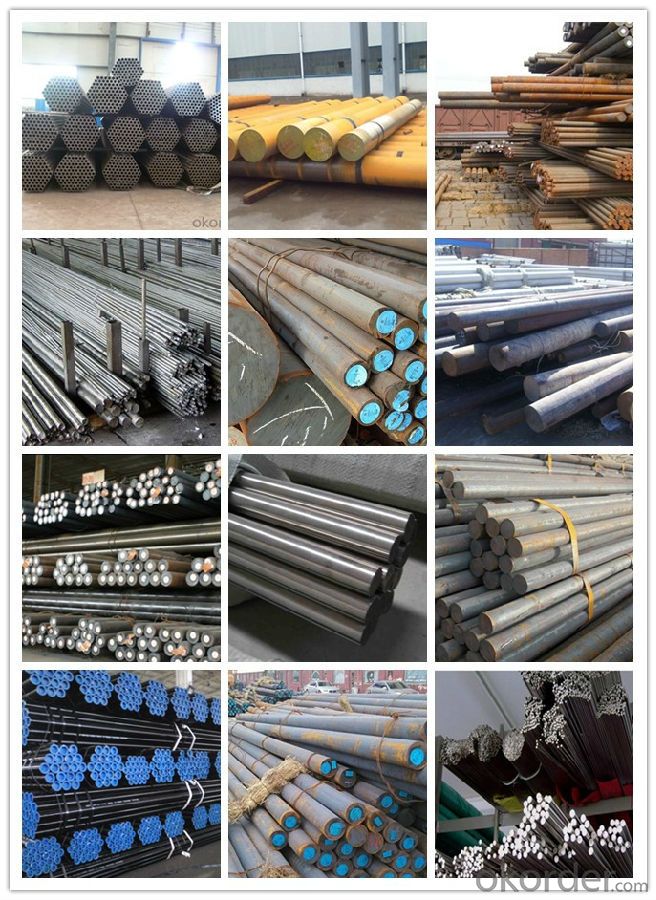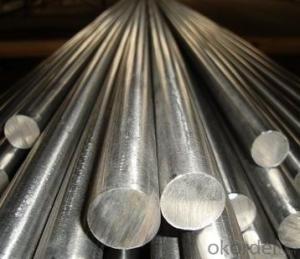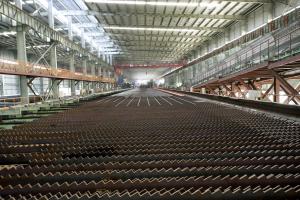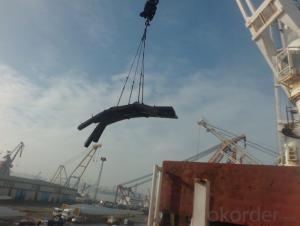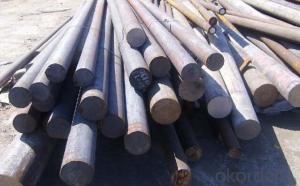Special Steel Hot-Rolled 15CrMo Steel Round Bar
- Loading Port:
- China main port
- Payment Terms:
- TT OR LC
- Min Order Qty:
- 30 m.t.
- Supply Capability:
- 10000 m.t./month
OKorder Service Pledge
OKorder Financial Service
You Might Also Like
Specification
Hot rolled 15CrMO steel round bar
other material available | Carbon and alloy: Cr-Mo alloy, Cr-Ni alloy, Cr-Mn alloy, Si-Mn alloy |
Dia.: | 10mm~1200mm |
Length: | Random or fixed as required |
Standard | GB,ASTM,JIS,BS |
Out Side Coating | Bare outside |
Ends | Plain ends with color painting |
Packing | Loose bundle |
Delivery | By container/train/lorry |
Third Party Inspection | SGS/BV/LORDS |
Delivery time | 7 days Min. |
Product show
Workshop show
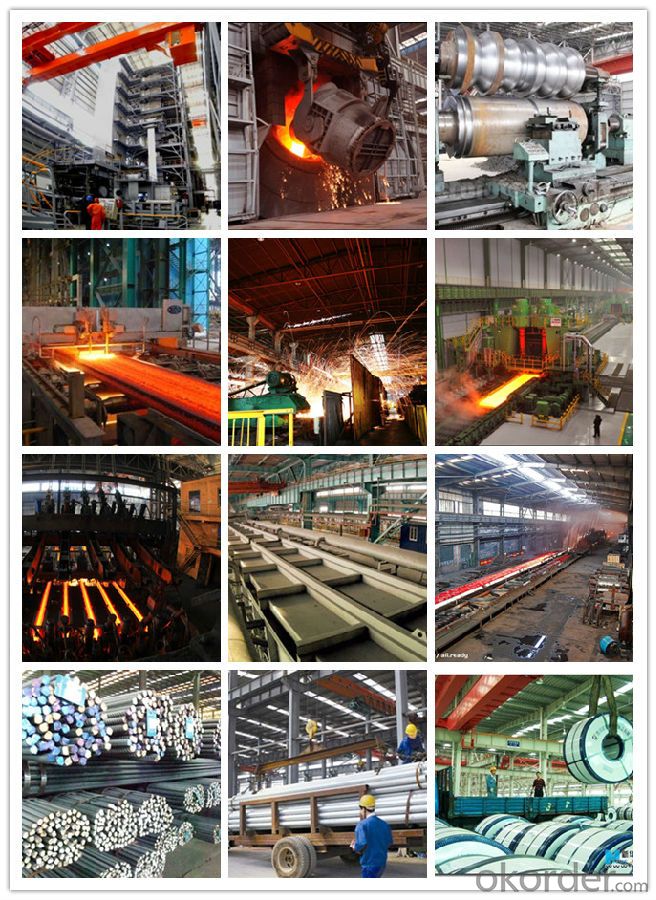
Shipping
1. FedEx/DHL/UPS/TNT for samples, Door-to-Door;
2. By Air or by Sea for batch goods, for FCL; Airport/ Port receiving;
3. Customers specifying freight forwarders or negotiable shipping methods!
Delivery Time: 3-7 days for samples; 5-25 days for batch goods.
Payment Terms
1.Payment: T/T, L/C, Western Union, MoneyGram,PayPal; 30% deposits; 70% balance before delivery.
2.MOQ: 1pcs
3.Warranty : 3 years
4.Package Informations: 1) EXPORT, In 20 feet (GW 25 ton) or 40 feet Container (GW 25 ton)
2)as customer's requirement
Why choose us?
(1) The leading exporter in China special steel industry.
(2) Large stocks for various sizes, fast delivery date.
(3) Good business relationship with China famous factories.
(4) More than 7 years steel exporting experience.
(5) Good after-sales service guarantee.
- Q: Can special steel be used in the energy sector?
- Yes, special steel can be used in the energy sector. Special steel refers to various types of high-performance alloys that are specifically designed for applications that require exceptional strength, durability, and resistance to corrosion and extreme temperatures. These properties make special steel an ideal choice for numerous components used in the energy sector. In the oil and gas industry, special steel is commonly used for the construction of pipelines, drilling equipment, and offshore platforms. Its high strength and corrosion resistance help in ensuring the integrity and reliability of these critical structures, even in harsh environments. Special steel is also widely utilized in power generation plants. For example, in thermal power plants, where steam is generated to produce electricity, special steel is used to manufacture boiler tubes and pressure vessels. The exceptional heat resistance and structural integrity of special steel ensure the safe and efficient operation of these components under high temperatures and pressure. Furthermore, special steel finds applications in renewable energy sectors such as wind and solar power. In wind turbines, for instance, special steel is used to manufacture rotor shafts, gears, and bearings, which are subjected to high mechanical loads. Similarly, in concentrated solar power plants, special steel is employed in the construction of the heat exchangers, receivers, and storage systems. Overall, the use of special steel in the energy sector is crucial for enhancing the overall performance, safety, and longevity of various components and structures. Its unique properties make it an indispensable material in supporting the energy industry's infrastructure and operations.
- Q: What are the different forging grades of special steel?
- In the market, there exists a variety of forging grades for special steel, each possessing its own distinctive characteristics and applications. Among the most frequently utilized forging grades are: 1. Carbon Steel: Noted for its exceptional strength and durability, carbon steel is a favored option for forging. Its hardness and toughness are determined by the varying levels of carbon present. Carbon steel forgings find widespread usage in the automotive, construction equipment, and machinery industries. 2. Alloy Steel: By incorporating diverse alloying elements, such as manganese, chromium, nickel, or molybdenum, into carbon steel, alloy steel is created. This augmentation enhances its strength, corrosion resistance, and wear resistance. The aerospace, defense, oil and gas, and power generation sectors extensively employ alloy steel forgings. 3. Stainless Steel: Stainless steel, an alloy resistant to corrosion, contains a minimum of 10.5% chromium. It boasts remarkable resistance against rust and staining, rendering it suitable for applications in harsh environments or where hygiene is of utmost importance. Stainless steel forgings are commonly employed in the food processing, chemical, and medical industries. 4. Tool Steel: Tailor-made for utilization in cutting tools, molds, and dies, tool steel exhibits high hardness, wear resistance, and toughness, enabling it to withstand elevated temperatures and heavy loads. Tool steel forgings are utilized in the production of drills, saw blades, punches, and an array of precision tools. 5. High-Speed Steel: High-speed steel, a specific type of tool steel, retains its hardness even when employed at high speeds. It incorporates additional elements such as tungsten, molybdenum, or vanadium, which enhance its resistance to heat and wear. High-speed steel forgings are employed in the production of cutting tools, drills, and milling cutters. 6. Maraging Steel: Maraging steel, a low-carbon, high-nickel steel alloy, is renowned for its extraordinary strength and toughness. Through heat treatment, it achieves high tensile strength while maintaining good ductility. Maraging steel forgings find extensive application in the aerospace, defense, and missile systems industries. These aforementioned examples merely represent a selection of the diverse forging grades of special steel available in the market. Each grade proffers distinct properties tailored to specific applications, ensuring the appropriate material can be chosen to meet desired performance and durability requirements.
- Q: How does special steel perform in medical applications?
- Special steel performs exceptionally well in medical applications due to its unique properties. It offers high strength, durability, and corrosion resistance, making it ideal for surgical instruments, implants, and medical devices. Special steel's biocompatibility ensures it doesn't react with body tissues, reducing the risk of complications or adverse reactions. Additionally, its malleability allows for precise shaping, facilitating the production of complex medical tools. Overall, special steel contributes to the efficiency and reliability of medical procedures, improving patient outcomes.
- Q: What are the properties of cobalt-based alloys?
- Cobalt-based alloys possess excellent strength, corrosion resistance, and high-temperature stability, making them suitable for various applications such as aerospace, medical implants, and industrial machinery. They also exhibit magnetic properties, good wear resistance, and the ability to withstand extreme environments, making them highly versatile and sought after in various industries.
- Q: Classification of special steel products
- Carbon structural steels are normally used directly under heat supply without heat treatment. The mass fraction of Q195, Q215, Q235 are usually of low carbon steel, good welding performance, good plasticity and toughness, a certain strength, often rolled into a sheet, steel, welded steel pipe, used for bridges, buildings and general manufacturing rivet, screw and nut parts etc.. Q255 and Q275 mass fraction of carbon steel is slightly high, high strength, good plasticity and toughness, can be welded steel, steel rolling, usually forming and plate structure and simple manufacturing machinery, connecting rod, gear coupling, pins and other parts. Plain carbon steel high carbon steel is basically contains alloy elements, the carbon content in the range of 0.65% ~ 1.35%, the production of low cost, easy to obtain raw materials, good machinability, after treatment can obtain high hardness and high wear resistance, so the steel is widely used to manufacture various. Cutting tool, mold, measuring tools.But the red hardness difference of this kind of steel, that is, when the working temperature is greater than 250 degrees, the hardness and wear resistance of steel will decline rapidly, and lose their ability to work. In addition, if carbon tools steel is made into larger parts, it is difficult to harden, and deformation and crack are easy to occur. This kind of steel must ensure both chemical composition and mechanical properties. The number is two digits by the average mass fraction of carbon steel in the 000 fraction (W C * 10000). For example, steel 45 shows the average mass fraction of carbon in steel is 0.45%; 08 steel indicates the average mass fraction of carbon in steel is 0.08%.
- Q: Is special steel suitable for electrical and electronic applications?
- Yes, special steel can be suitable for electrical and electronic applications. Special steel refers to steel alloys that have been specifically designed to possess certain properties or characteristics that make them suitable for particular applications. In the case of electrical and electronic applications, special steel can offer various advantages. One of the key requirements for electrical and electronic applications is high electrical conductivity. While steel is not typically known for its electrical conductivity, certain special steel alloys can be engineered to have improved electrical conductivity. For example, stainless steel can be alloyed with elements such as nickel or copper to enhance its electrical conductivity, making it suitable for applications where electrical current needs to flow efficiently. Another important factor for electrical and electronic applications is magnetic properties. Some special steel alloys exhibit excellent magnetic properties, making them ideal for applications such as transformers, motors, and generators. These alloys can possess high magnetic permeability, low coercivity, and low hysteresis losses, which are crucial for efficient energy transfer and minimal power loss. Furthermore, special steel can also provide excellent corrosion resistance, which is essential in electrical and electronic equipment that may be exposed to moisture or harsh environments. Stainless steel, for instance, is highly resistant to corrosion, ensuring the longevity and reliability of the equipment. In summary, special steel can be suitable for electrical and electronic applications when it possesses the necessary electrical conductivity, magnetic properties, and corrosion resistance. By choosing the appropriate special steel alloy, manufacturers can ensure the performance, durability, and reliability of electrical and electronic equipment.
- Q: What are the main advantages of using special steel in the food processing industry?
- The main advantages of using special steel in the food processing industry are its exceptional strength and durability, resistance to corrosion and bacteria growth, and ease of cleaning and maintenance. Special steel is highly resistant to wear and tear, ensuring longevity and reducing the need for frequent replacements. Its corrosion resistance properties prevent contamination and maintain the integrity of food products. Additionally, special steel's smooth surface and non-porous nature make it easy to clean, ensuring optimal hygiene standards in food processing facilities.
- Q: How does special steel contribute to the defense sector?
- Special steel plays a crucial role in the defense sector by providing various benefits and applications that enhance national security. Firstly, special steel is known for its superior strength, durability, and resistance to wear and corrosion. These properties make it an ideal material for the production of military equipment and weaponry. Special steel is used in the manufacturing of tanks, armored vehicles, naval ships, and aircraft carriers, ensuring their structural integrity and protection against enemy attacks. Additionally, the use of special steel in the construction of ballistic armor and bulletproof vests enhances the safety of soldiers on the battlefield. Moreover, special steel alloys offer excellent thermal resistance and high-temperature capabilities, making them suitable for the production of jet engines, turbines, and rocket components. These materials can withstand extreme conditions, enabling faster and more efficient military aircraft, missiles, and space exploration vehicles. Furthermore, special steel is used in the defense sector for its electromagnetic properties. It is employed in the development of radar systems, communication devices, and electronic warfare equipment. Special steel alloys can effectively shield against electromagnetic interference, ensuring secure and reliable communication in critical defense operations. Additionally, special steel plays a vital role in the production of precision tools and machinery used in the defense sector. It offers high machinability, allowing for the fabrication of complex components with tight tolerances. Special steel is used in the manufacturing of military-grade cutting tools, drills, and machine parts, enhancing the efficiency and effectiveness of military operations. In summary, special steel contributes significantly to the defense sector by providing strength, durability, resistance, and various other crucial properties. Its applications in military equipment, weaponry, armored vehicles, aircraft, and electronic systems enhance national security, protect soldiers, and enable advanced defense capabilities.
- Q: How does special steel resist fatigue?
- The durability and strength of special steel are enhanced through the incorporation of specific properties that resist fatigue. The high tensile strength of this steel is a primary factor in its ability to withstand stress and load without deforming or breaking, preventing the initiation and spread of fatigue cracks. In addition, special steel often undergoes heat treatment processes like quenching and tempering to further enhance its fatigue resistance. This alters the steel's microstructure, creating a fine and uniform grain structure that improves its mechanical properties. It increases hardness and toughness, reducing susceptibility to fatigue failure. Furthermore, special steel can be alloyed with elements like chromium, molybdenum, and vanadium to enhance its resistance to fatigue. These elements form carbides and other strengthening phases within the steel, improving hardness, strength, and resistance to fatigue crack propagation. Moreover, specialized surface treatments like shot peening and nitriding can be applied to special steel. Shot peening involves bombarding the steel surface with small metal particles, inducing compressive residual stresses. These stresses counteract the tensile stresses that cause fatigue cracks, thus enhancing fatigue resistance. Nitriding involves diffusing nitrogen into the steel surface, creating a hardened layer that improves wear resistance and, consequently, fatigue resistance. In conclusion, special steel resists fatigue through a combination of factors, including high tensile strength, specific heat treatment processes, alloying elements, and specialized surface treatments. These properties work together to enhance the steel's durability, strength, and resistance to fatigue crack initiation and propagation, making it a reliable and long-lasting material for various applications.
- Q: What are the safety considerations when working with special steel?
- When working with special steel, there are several safety considerations that need to be taken into account. Firstly, special steel can have high heat resistance, so it is important to use appropriate personal protective equipment (PPE) such as heat-resistant gloves, face shields, and fire-resistant clothing to prevent burns or other heat-related injuries. Secondly, special steel can be heavy and may require the use of lifting equipment or proper lifting techniques to prevent strains or muscle injuries. Additionally, special steel may contain elements or chemicals that could be hazardous if inhaled or ingested, so proper ventilation and respiratory protection should be used. Lastly, the use of sharp tools or equipment is often necessary when working with special steel, so it is crucial to follow safe handling practices and use proper tool guards to prevent cuts or punctures. Overall, awareness of these safety considerations and adherence to safety protocols is essential to ensure a safe working environment when dealing with special steel.
Send your message to us
Special Steel Hot-Rolled 15CrMo Steel Round Bar
- Loading Port:
- China main port
- Payment Terms:
- TT OR LC
- Min Order Qty:
- 30 m.t.
- Supply Capability:
- 10000 m.t./month
OKorder Service Pledge
OKorder Financial Service
Similar products
Hot products
Hot Searches
Related keywords
